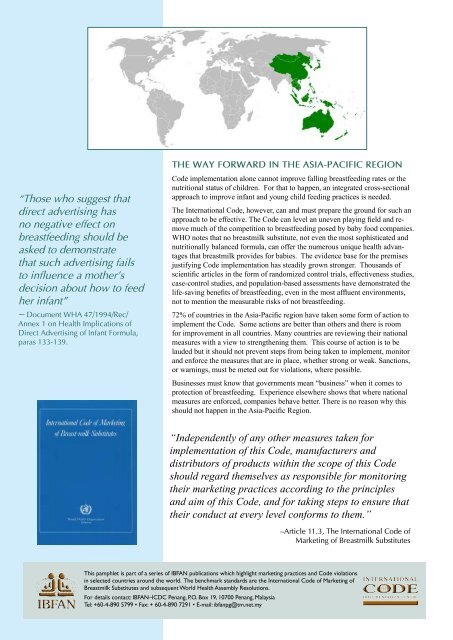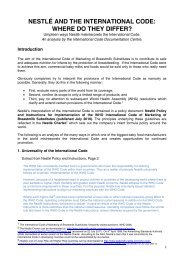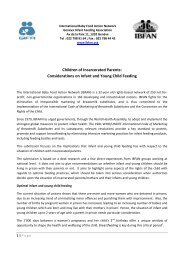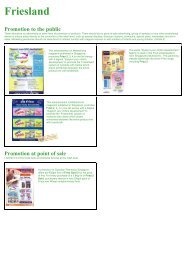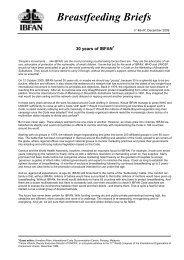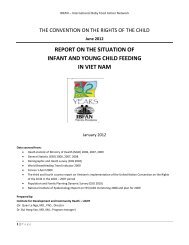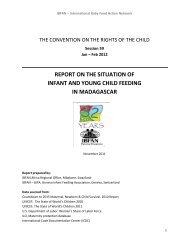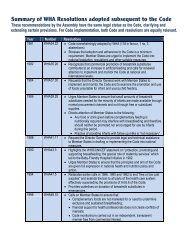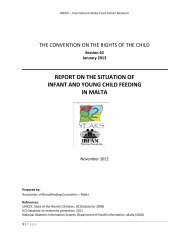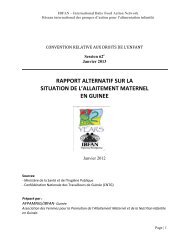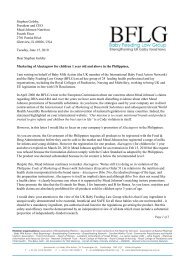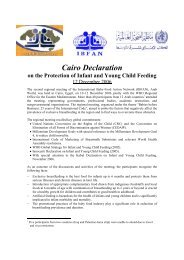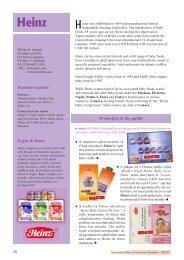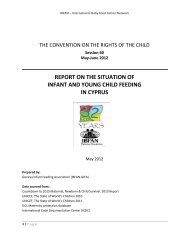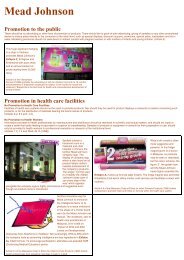AsiA-PAcific - IBFAN
AsiA-PAcific - IBFAN
AsiA-PAcific - IBFAN
Create successful ePaper yourself
Turn your PDF publications into a flip-book with our unique Google optimized e-Paper software.
“Those who suggest that<br />
direct advertising has<br />
no negative effect on<br />
breastfeeding should be<br />
asked to demonstrate<br />
that such advertising fails<br />
to influence a mother’s<br />
decision about how to feed<br />
her infant”<br />
– Document WHA 47/1994/Rec/<br />
Annex 1 on Health Implications of<br />
Direct Advertising of Infant Formula,<br />
paras 133-139.<br />
The way forward in the Asia-Pacific Region<br />
Code implementation alone cannot improve falling breastfeeding rates or the<br />
nutritional status of children. For that to happen, an integrated cross-sectional<br />
approach to improve infant and young child feeding practices is needed.<br />
The International Code, however, can and must prepare the ground for such an<br />
approach to be effective. The Code can level an uneven playing field and remove<br />
much of the competition to breastfeeding posed by baby food companies.<br />
WHO notes that no breastmilk substitute, not even the most sophisticated and<br />
nutritionally balanced formula, can offer the numerous unique health advantages<br />
that breastmilk provides for babies. The evidence base for the premises<br />
justifying Code implementation has steadily grown stronger. Thousands of<br />
scientific articles in the form of randomized control trials, effectiveness studies,<br />
case-control studies, and population-based assessments have demonstrated the<br />
life-saving benefits of breastfeeding, even in the most affluent environments,<br />
not to mention the measurable risks of not breastfeeding.<br />
72% of countries in the Asia-Pacific region have taken some form of action to<br />
implement the Code. Some actions are better than others and there is room<br />
for improvement in all countries. Many countries are reviewing their national<br />
measures with a view to strengthening them. This course of action is to be<br />
lauded but it should not prevent steps from being taken to implement, monitor<br />
and enforce the measures that are in place, whether strong or weak. Sanctions,<br />
or warnings, must be meted out for violations, where possible.<br />
Businesses must know that governments mean “business” when it comes to<br />
protection of breastfeeding. Experience elsewhere shows that where national<br />
measures are enforced, companies behave better. There is no reason why this<br />
should not happen in the Asia-Pacific Region.<br />
“Independently of any other measures taken for<br />
implementation of this Code, manufacturers and<br />
distributors of products within the scope of this Code<br />
should regard themselves as responsible for monitoring<br />
their marketing practices according to the principles<br />
and aim of this Code, and for taking steps to ensure that<br />
their conduct at every level conforms to them.”<br />
–Article 11.3, The International Code of<br />
Marketing of Breastmilk Substitutes<br />
This pamphlet is part of a series of <strong>IBFAN</strong> publications which highlight marketing practices and Code violations<br />
in selected countries around the world. The benchmark standards are the International Code of Marketing of<br />
Breastmilk Substitutes and subsequent World Health Assembly Resolutions.<br />
For details contact: <strong>IBFAN</strong>–ICDC Penang, P.O. Box 19, 10700 Penang, Malaysia<br />
Tel: +60-4-890 5799 • Fax: + 60-4-890 7291 • E-mail: ibfanpg@tm.net.my


